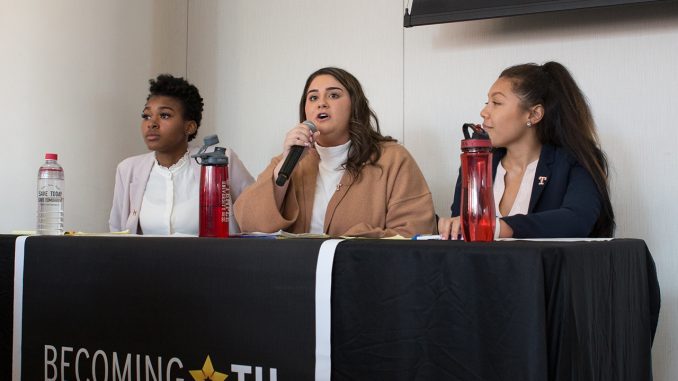
Earlier this month, students at Temple University made university history by electing BecomingTU — an all-women campaign — as the 2019-20 Temple Student Government.
“Why do I need a white male to speak for a Black woman when there’s a Black woman who can speak for herself?” asked Calyx Clarkson, a senior theater major and BecomingTU’s director of operations.
TSG has had a woman president in the past, including law and business alumna Nadine Mompremier in 2008-09 and early education alumna Natalie Ramos-Castillo in 2010-11. But this will be the first time the top-three spots are led by all women.
On Temple’s administrative level, current president Richard Englert and nine of the university’s former 10 presidents have been men. Ann Weaver Hart, who served from 2006-12, was Temple’s first and only woman president to date. Out of the 14 deans that serve Temple’s 17 schools and colleges, only two deans are women — in the Tyler School of Art and the College of Public Health. Additionally, of the university’s 33 current trustees, only six are women.
“In order to uplift other women you need to be willing to make the jump,” said Katherine Desrochers, a junior political science and strategic communication major and BecomingTU’s director of communication. “Our campaign is a testament to that.”
The executive team-elect faced scrutiny during the campaign they believe their male counterparts would not have faced, Clarkson said.
Several students approached campaign members to say their logo was “too cutesy,” its social media was “too girly” and its campaign video “looked like a sorority video,” said Marissa Martini, a senior secondary education and English major and BecomingTU’s chief strategist.
“There were a lot of things said to us that I don’t think would have been said to a campaign with men in it,” Martini added, “Even just one man.”
Clarkson believes the reason women aren’t participating at the same rate as men in politics is because of intimidation, she said.
Running for TSG as an all-women campaign was at times scary because the members had to be vulnerable to comments and criticism from outsiders, said Kaya Jones, a junior political science and journalism major and the vice president-elect of external affairs for BecomingTU.
“They thought their comments could break us down and that we weren’t strong enough to handle it,” Jones said. “[They thought] our emotions would get the best of us, as people think women’s emotions do, but we only took those in stride.”
“As an all-female campaign, we have to be flawless,” Desrochers said. “If we’re not, then they’re going to come at us 10 times harder. …We definitely saw that.”
This sexism is apparent at every level of government. In the 2016 presidential election, Hillary Clinton was questioned about the impact her menstrual cycle would have on her leadership. A man from Pennsylvania questioned this in a letter to the editor of the Williamsport Sun-Gazette, New York Magazine’s The Cut reported.
Responding to these sorts of criticism or attacks can be difficult, Martini said.
“There’s no ‘sweet spot’ between being vulnerable and being tough,” Martini added. “You’re either too sweet, too lenient, too much of a pushover, or you’re too tough.”
Likewise, campaign members felt that some students doubted three women could represent the needs of students and were concerned people asked: “Do you think you can lead this school as three women?”
“The answer to that, every time, was ‘Yes,” said Francesca Capozzi, student body president-elect.


Be the first to comment